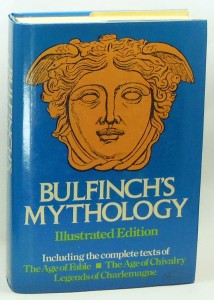 This book is better known as one third of a classic volume–Bulfinch’s Mythology, which includes The Age of Fable (published 1855), The Age of Chivalry, or Legends of King Arthur (published 1858) and Legends of Charlemagne. The whole collection was one of my constant companions through childhood. I wore out the copies at my elementary and middle school libraries, I’m sure. It’s a great reference book, and, indeed, a lot of libraries keep a copy in their non-circulating reference collection. Or used to. I don’t really know what libraries keep in their reference collections in these post-Internet days.
This book is better known as one third of a classic volume–Bulfinch’s Mythology, which includes The Age of Fable (published 1855), The Age of Chivalry, or Legends of King Arthur (published 1858) and Legends of Charlemagne. The whole collection was one of my constant companions through childhood. I wore out the copies at my elementary and middle school libraries, I’m sure. It’s a great reference book, and, indeed, a lot of libraries keep a copy in their non-circulating reference collection. Or used to. I don’t really know what libraries keep in their reference collections in these post-Internet days.
But I kept Bulfinch’s Mythology on hand, I confess, primarily for the sake of reading and re-reading The Age of Fable. Until this year, with the exception of occasionally reading a brief entry on some character from Arthurian lore for research, I’d never read the second two books in the compendium. So, over the course of the past few weeks, having nothing else to do (hah!), I tackled these tales of the Round Table, and their token coverage of Robin Hood, King Richard and a few other note-worthies of British folklore.
And, I gotta tell you… I can see why I waited. I may never read Legends of Charlemagne. That’s a shame, as there’s evidence I’m descended from him (through one of his concubines, of course.)
What was my issue with The Age of Fable? Maybe it was just one of those things where I’d loved something when young, only to discover it didn’t live up to my memories? I don’t think so. I’ve recently re-read The Age of Fable, and it holds up just fine. No, I think my problem is… sorry… I don’t like the story of King Arthur and his knights very much. It’s all just a bit too, well… warlike.
I know, right? Knights are supposed to be warlike. They’re supposed to slay dragons and evil black knights while rescuing fair maidens, right? Well, the fact is, an awful lot of the slaying was not of dragons. None of it was, in fact. And most of the people being slain were not evil black knights, larger than life, but just poor schlubs who didn’t have any other options but to get between the knights and whatever the hell it was they were fighting for.
After a while, it was just… boring.
It’s a little sad, really. I love Greek Mythology. Although the gods can be petty, and the good guys don’t always win, the stories are imaginative, and there’s some sense of justice. The supernatural is always present. The larger than life is the life that’s shown. It gives the reader something to aspire to.
But now I know why I always got bored, later in most volumes of Greek Myth, when the story of the Trojan War was rolled out for inspection. I just couldn’t find myself giving a damn about it. And I think the upshot is, I don’t want to read about war. I don’t want to read about killing. I certainly don’t want to read about how Arthur and Lancelot got into a fight over a woman (like she was property, and not a person–oh, right… she was property), and how they led thousands of men to their deaths… then made up and swore to be friends again.
The hell? You convinced all those guys to give their lives in support of you killing each other and then you… made up?
What about all the dead guys??!!!
Oh, well, I guess they don’t matter because they weren’t noble.
It’s all too close to home for me, I think. Too close to what happens in real wars, when little people who don’t matter die for the glory of a couple people about whom history will be written. It’s why I don’t believe in the “moral war,” and why I can really enjoy a book like this. It’s funny, because I studied Arthurian Legend in college. It wasn’t like this. It wasn’t all war. It was more magic and courtly love and the tricks men and women played on each other as they tried to win each others’ hearts and bodies. There’s a lot to enjoy in the Arthurian mythos.
Sadly, The Age of Chivalry doesn’t really bring that out. Maybe it’s just too… English. (Keep in mind that, genetically, I’m about 90% English.) It reads a bit like someone set out to write another testament for the Bible, and this time the account was as bloodthirsty and jingoistic on the side of the Brits as the Old Testament is to the side of the Tribes of Israel. (Try reading the account of the day Jehovah stopped the sun in the sky for Joshua, and forced Israel’s enemies to stay on the battlefield and die, using hailstones. Or how He sent the bears to eat the 42 boys who made fun of Elisha for being bald. They wanted me to teach that stuff to kids in Sunday School!)
I’m not hugely into Arthur and his knights, but, if you’re looking for some Round Table high jinks, I recommend you stick to The Once and Future King, or perhaps Camelot 3000.
